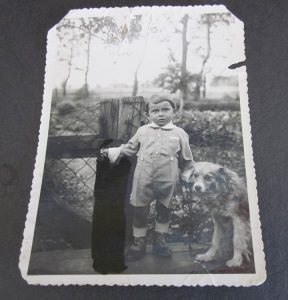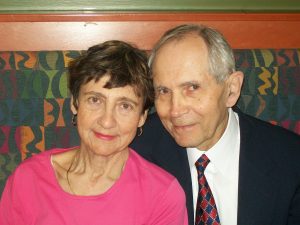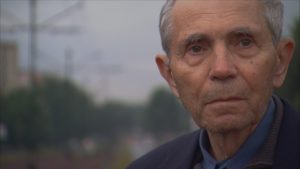Story #18 Ed Herman
“Life was great,” Ed says, “I had loving parents.” Recalling his childhood in Katowice, Ed still remembers the addresses of his home and his father’s business. “I remember, I never forgot it,” Ed says. The family car allowed Ed and his younger sister to go on excursions with their father, with whom Ed was very close. “Things were wonderful,” Ed recalls—until 1939.
 (Ed as a child before the war began)
(Ed as a child before the war began)
On September 1, 1939, Germany invaded Poland. “It’s easy to start a war; it’s much harder to stop a war,” Ed observes. Of his comfortable life in Katowice, Ed says, “All this came to an end, for me, at the end of August of 1939.” Ed was still young when the war began, only seven-and-a-half years old, but he remembers seeing German soldiers on the streets. Ed’s father packed up the family car and told him they were going to visit his grandfather.
“All the toys and everything else that a seven-year-old had, all this was left behind,” Ed recalls, “and I never saw it again.” Ed left Katowice at the end of August in 1939; it would be 72 years before he returned.
“My childhood was stolen from me,” Ed says, “at the age of seven-and-a-half.”
“When I look at my life story, my personal journey, it’s a chronicle of strong faith, which was very important for me,” Ed says, “and strength in the face of adversity, a story of close escapes against all odds, miraculous survival.”
After his family returned to Warsaw, Ed’s father joined the Polish Army. “I missed him greatly, I was very close to my father,” Ed recalls. He would not see his father again for ten years.
In Warsaw, Ed witnessed the formation of the Warsaw Ghetto. “After Warsaw surrendered to the Nazis, persecution of the Jewish people began almost immediately. I saw a great deal of suffering, starvation, the ghetto was overcrowded, there was a typhoid epidemic, and many buildings, including the one which I was in, were quarantined . . . . I was constantly hungry, the bread which we got was full of sawdust and there wasn’t enough of it, during the winter it was extremely cold.”
Ed remembers dreaming of the Kaiser rolls he used to get for breakfast, as he ate the meager bread offered him in the Ghetto. “What you saw in the Ghetto were starving children, begging for food on the street.”
Ed recalls seeing bodies on the streets of the Warsaw Ghetto covered only in newspaper. “We didn’t have enough time to remove the people who passed away, there were many, because it was so overcrowded.” The Nazis continued to move more people into the Warsaw Ghetto, in order to concentrate the population in one area. From the Warsaw Ghetto, most people were deported from the Umschlagplatz, or transfer point, where they were often taken to Treblinka. “There were many other death camps, but most of the Warsaw Jews ended up in Treblinka,” Ed says.
In the case of Ed’s aunt, who was deported from the Łódź ghetto to Chełmno extermination camp, records of her deportation were later uncovered, and sent to Ed’s family. “This is unusual,” Ed says, “to know exactly when she was killed, the day of it.”
Ed’s father had been born in Łódź, where he had four brothers and three sisters. “One of his sisters went to Palestine before the war, another sister survived, one of his brothers also left Poland before the war,” Ed says. “Two of his brothers, and two of his sisters, perished during the Holocaust.”
One night, Ed went to see a play, put on in the Warsaw Ghetto, with his cousin. By the time the play ended, it was curfew. “If they caught you during the curfew on the street you could be shot,” Ed recalls. Ed’s cousin was older than him, but she was afraid too. “It was very eerie, walking on those streets that were crowded during the day. But I was the only one walking. But, somehow, I made it.”
At this same play, Ed saw Janusz Korczak in the audience, a well-known author and the head of an orphanage in the Ghetto. “When they started deporting people to the death camp of Treblinka, the orphanage was ready for the deportation, and many Poles, from outside the Ghetto, wanted to save Doctor Korczak, because he was a very special person,” Ed recalls. “Well, he did something very unusual. He said, ‘I’m not going. I’m going to stay with my children, because they would be very afraid if I’m not with them.’ So he perished together with his children.”
The liquidation of the Warsaw Ghetto began in the summer of 1942, following the decisions of the Wannsee Conference earlier that year. As deportations increased, Ed’s mother decided that the best chance of survival for her children was to smuggle them out of Warsaw. At eleven years old, Ed passed through various Polish cities, before eventually being smuggled out of the country, without any of his family. Ed’s mother paid for his passage into Budapest, Hungary, which, at the time, was considered a relatively safe place.
“Like the mother of Moses, my mother had to let me go, in order for me to live,” Ed says. “She didn’t know if I would survive. When I think about it, it takes a lot of courage for a parent to let their child go, without knowing if they will make it.” As Ed and the men he traveled with passed into Slovakia, however, they were captured by the police. “They took us to jail, stripped us naked, took everything we had,” Ed recalls. Since Slovakia was still independent, Ed and his group were released, upon payment.
After travelling through the night, evading guards and watchdogs, Ed finally made it to Hungary. Ed went with the man who was supposed to take care of him, while his other two companions were captured and eventually taken to Auschwitz, where they would survive the war. “I ended up with this individual, in Budapest, and he was supposed to take care of me. I was only 11 years old,” Ed says.
After being fed a meal with his caretaker’s family, Ed was taken to a coffeehouse where Polish-Jewish refugees congregated and was left on his own. “Suddenly, the only thing I had was what I was wearing. No papers, no language, nothing.” Ed began to cry, which attracted the attention of another Polish refugee, who allowed Ed to stay with her for the night. “After that, I ended up living on the streets of Budapest, not knowing where I would sleep the following night.”
A few weeks after Ed’s arrival in Budapest, an orphanage was started, where Ed was taken in with other children. He survived the war in this orphanage, where the director, a Christian, lied about the religion of the children he housed. “The war forces you to grow up in a hurry,” Ed remarks.
After the war, Ed eventually reunited with his immediate family—his parents and younger sister. He later learned that his father survived in Palestine, after fighting on the Eastern Front and surviving a Siberian labor camp. Ed was a teenager by the time he saw his father again, a full decade after he left to fight in the Polish Army. “You leave a child,” Ed says, “and then you end up with a teenager, who has ideas of his own, and cannot be bossed around by a father. That created some friction, obviously.”
Ed has lived in many different countries and speaks several languages. He completed his education in Canada, where he earned his PhD from McGill University in Montreal. He taught economics at the State University of New York and the University of Cincinnati before he retired to St. Petersburg, Florida, where he lives with his wife. Ed has two children and four grandchildren. His sister and brother-in-law live nearby in Sarasota.
 (Ed and his wife in 2017)
(Ed and his wife in 2017)
In 2011, Ed and his wife returned to Poland for the first time since Ed escaped the Warsaw Ghetto. Through a relative, Ed was put in contact with a film crew, and his return to Poland was featured in the documentary Never Forget to Lie. Ed explains that the title of the film references the lies and deception necessary to survive the Holocaust: “We were forced to do things which were not very comfortable, but necessary for survival.”
About a year ago, Ed received a copy of a postcard, sent to Paris, France, and stamped by a German censor. “When I got a copy of this card, I couldn’t stop crying,” Ed says. The postcard was originally sent by Ed’s grandfather, who lived with Ed in the Warsaw Ghetto, to Ed’s aunt in Paris, during the war. “This was a very significant. There are very few situations like this, where a card was sent out, from the Warsaw Ghetto, to France, and it survived,” Ed says.
 (Ed visiting Poland in 2011)
(Ed visiting Poland in 2011)
When he returned to Poland in 2011, Ed visited Treblinka. Now, Ed says, the monument is “a beautiful place: there are all the trees, birds singing, smells of flowers from the fields, and it’s hard to imagine that such atrocities could take place in a place like this, Treblinka.”
While he was visiting Treblinka, Ed recited the Kaddish, the Jewish prayer for the dead. “Although usually for the Kaddish you need ten people,” Ed explains, “it was just me, and the film crew, but I felt that I wasn’t alone, because the ghosts of my relatives were with me, and I was reciting the prayer for the dead.”
Story by: Marius Black and Sarah Hagerty
Edited by: Sarah Hagerty, Jared Stark, and Kristen Wright
